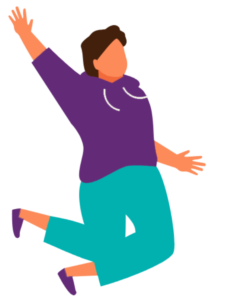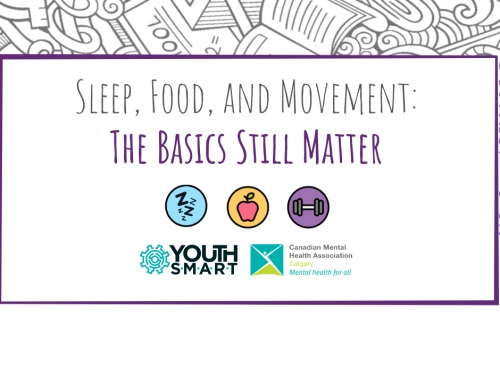Physical Activity Improves Mental Well-Being
Focusing on your physical well-being can be key to improving your mental health. Years of evidence have proven that exercising, even as little as moving your body for a short amount of time, has immediate long-lasting and protective benefits for the body as well as the brain which directly correlates with your mental health.
How Does It Work?
Neuroscientist Wendy Suzuki has readjusted her research to focus on understanding how aerobic exercise, a cardiovascular activity that will increase your breathing and heart rate such as walking or cycling, can be used to improve human cognitive abilities such as memory, learning, thinking, focusing, mood regulation, etc.¹

Physical activity has an effect on the following brain functions that control major psychological and physical elements of our bodies. Short-term exercise has the ability to improve decision-making, focus, attention, behaviour, memory and movement.
“Exercising to increase your fitness literally builds brand new brain cells. It changes your brain’s anatomy, physiology and function,” Suzuki explains.
Suzuki and thousands of researchers urge people to see physical activity through a different lens that focuses on improving the state of your emotional and mental well-being.
Physical Activity Benefits
Physical activity attributes much more to how you feel and react. Psychological effects of daily physical activity include:²
- Lowered levels of depression: Continuously being active can cause new activity patterns in the brain to promote feelings of well-being. This good feeling is courtesy of natural chemicals called endorphins. They are released into the body to relieve stress and pain.
- Lowered levels of stress: Along with the endorphins being pumped out from the brain, movement can relieve symptoms of physical pain including tense and strained muscles. By putting your body into an active mode, you will be able to actually feel the tension slowly fading away from your muscles, as well as the mind.
- Lowered levels of anxiety: Purely focusing on body movement can break the anxiety cycle. Any amount of activity is enough to settle the mind of racing thoughts and give you a different perspective. Adding the mindfulness component is not only anti-anxiety inducing but therapeutic.
- Lowered levels of trauma: Similar to anxiety, focusing your entire movement and mindset on an aerobic activity such as swimming or hiking can relieve your nervous system of going into panic mode. Getting into a full-body activity can reroute your brain from diving into negative streams of thought.
- Lowered levels of sleep deprivation: Exercise at any point in the day can promote and regular sleeping patterns.
- Increased levels of happiness and self-love: Regular activity is an investment in your mind, body, and even your soul.
- Increased resiliency: Using physical activity as a stress-reliever can help build resilience and cope with challenges in a healthy way instead of resorting to damaging behaviours.
Reaping the mental health benefits of physical activity is easier than you think. You don’t have to put your body into extreme modes of physical activity to feel a difference.
COVID-19 Impacts
Isolation and province-wide restrictions have been a factor in limiting Canadian’s physical and social interactions. This can not only limit activity but also have long-term psychological effects.
Depression, post-traumatic stress, acute stress disorder, exhaustion, detachment from others, anxiety, emotional exhaustion, and irritability are among other trauma-related mental health disorders that have affected people in quarantine. However, physical activity has been shown to produce positive impacts in most of these disorders.³
Although COVID-19 has forced strict measures to restrict the virus from spreading, you can still fulfill physical activity safely in your neighbourhood, and from home.
Implement Fitness Into Your Routine
- Consider taking your bicycle, walking, or getting off a few stops before you usually would on public transit to school.
- Has your school moved back to virtual learning? Schedule 30 minutes from your school day to get away from your computer and complete an activity, whether that is going for a walk outside with the dog, stretching, going for a bike ride, Zumba in your living room, meditating—whatever will get you on your feet.
- Try out some desk-friendly exercises that will get your heart pumping and restrict body stiffness.
Get the Other Members of Your Family Involved
- Make it a regular weekend outing to take out all the bicycles and go for a ride around the neighbourhood.
- Go one-on-one or team up with the rest of the family for a friendly game of basketball at your local court.
- Kick a soccer ball around at your neighbourhood field.
- Play in the background.
- Turn on the family favourites and have a dance party.
- Make an indoor/outdoor obstacle course.
- Participate as a family in a physical and mental wellness challenge (e.g. CMHA Calgary’s Energize Don’t Hide 2021 Challenge).
Don’t Forget To Practice Self-Care
It is just as important to give yourself time to repair after physical activity. You can achieve this by enjoying a bath with Epson salts, having a nap, drinking water, enjoying a hot cup of tea, meditating, stretching or winding down with your favourite show, are just a few ways to reward yourself in a healthy way because self-care is essential to how you feel post-workout. Always remember to be kind to your body, as well as your mind.
“Bringing exercise in your life will not only give you a happier, more protective life today, but it will protect your brain from incurable diseases. And in this way it will change the trajectory of your life for the better.”
Wendy Suzuki | Neurologist
–
¹Suzuki, Wendy. “The brain-changing benefits of exercise.” Filmed November 2017. TED video, 12:54, https://www.ted.com/talks/wendy_suzuki_the_brain_changing_benefits_of_exercise?language=en
²Robinson, Lawrence, Jeanne Segal, Ph.D, and Melinda Smith, M.A. “The Mental Health Benefits of Exercise.” HelpGuide. October, 2020. https://www.helpguide.org/articles/healthy-living/the-mental-health-benefits-of-exercise.htm
³Amatriain-Fernández, Sandra, Eric Simón Murillo-Rodríguez, Thomas Gronwald , Sergio Machado, and Henning Budde. “Benefits of physical activity and physical exercise in the time of pandemic.” Psychological Trauma: Theory, Research, Practice, and Policy 12, no. 1 (2020): S264–S266. Accessed April 15, 2021. https://psycnet.apa.org/doi/10.1037/tra0000643.
You are not alone. There is help.
If you cannot find someone you trust who is willing to support you, dial a crisis line right away at 403-266-HELP (4357) All crisis lines are confidential.
YouthSMART would like to thank Sagium and Kinsted Wealth for being our 2020 – 2021 website sponsor.






